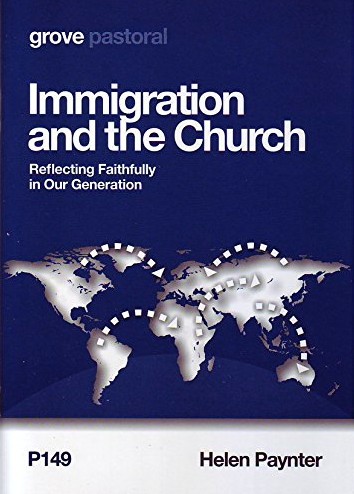Immigration and the Church by Helen Paynter
Brief, deep and rich theological reflection that will be an asset to anyone wanting to get better informed about this most pressing issue
 Immigration and the Church: Reflecting Faithfully in Our Generation
Immigration and the Church: Reflecting Faithfully in Our Generation
By Helen Paynter
(Grove Pastoral 149; Cambridge: Grove, 2017)
ISBN: 978-1788270045
Reviewed by Simon Jones
Newspaper headlines have been screaming about the refugee crisis engulfing Europe for a number of years; churches have been quietly welcoming the stranger in our midst over that time; and many Christians have been attempting to respond creatively to the presence of refugees just beyond our shores in Calais and Greece.
Now Helen Paynter, Baptist minister and Tutor at Bristol Baptist College, has written an incisive, irenic and richly theological reflection on this situation that will be an asset to anyone wanting to get better informed about what is going on. As the motto of Grove Books suggests, this is not the last word on this subject but it is a first word that leads in a number of helpful and suggestive directions.
Paynter begins with a well-informed overview of the language and statistics of the situation. She arrests her readers with sentences like, ‘one in every 113 people alive today has been forcibly displaced from their home,’ (p3) and ‘the issue of migration is an exemplar in how the use of language can and has become an ideological weapon.’ (p4). This kind of writing sucks the reader into the presence of a lively and incisive guide through the thickets of this issue.
The disputes over what labels to hang around the necks of displaced people are live and revealing. Are those clamouring to reach safety in Europe ‘migrants’, ‘refugees’ or ‘displaced people’? One of the organisations which whom we have been working in Calais over the past two years refers to the arrivals in our midst as ‘exiles’. For me this captures something of the sense of dislocation that most who lived in Calais’ jungle felt. And it captures the temporary nature of their displacement; so many of our new friends would dearly love to go home if they could. But it also carries suggestive theological nuance that opens the doors to reflection on a rich Biblical theme. Paynter doesn’t use this term, settling in the main on ‘migrant’.
Her opening chapter concludes with some brief remarks on the complexity of migratory flows into and out of Europe over recent generations. Nearly every section of her work cries out for elaboration - she only has 30 pages to play with, about 6,000 words - which I hope might be forthcoming in the fullness of time as she continues to wrestle with these problems. But this work is carefully and well referenced, giving the reader plenty of scope for following ideas and building on the reflections contained here.
Paynter explores the nature of welcome and neighbour love in chapter two, interacting with the abjection theories of Julia Kisteva in a way that throws light on how the Bible deals with ‘othering’ and what resources it might offer us as we offer welcome to the stranger in our midst. In chapter three she interacts with the Italian theorist, Giorgio Agamben, a philosopher who is not exactly a household name in our churches. She reflects on the migrant as one who embodies bare life. Her focus here might have been clearer: I could not make my mind up whether those of us who entered the Calais camp in possession of our passport and ticket home were really in ‘the state of exception’ as Agamben envisages it. That said, however, her reflections in this area were moving and helpful. And her application of Agamben’s language to Jesus was very powerful.
In chapter four Paynter turns to Maslow and how his hierarchy of needs informs discussions of migration. She does it in a way that suggests that one response to the current crisis is driven by consumerist complacency on the part of those in European cities objecting that there is no room for these newcomers, that our housing stock and health services are already over-stretched by domestic demand in these times of austerity. I think I would have liked a paragraph exploring whether austerity is necessary or is a political choice exercised by those claiming the country cannot afford to respond.
Finally, Paynter explores how we might recentre our faith by seeing in the eucharist a model of welcome and inclusion that could be adopted by every Christian community in the land.
In her conclusion she suggests that she has avoided writing a political book because that might have alienated her readers. It strikes me that this issue above all others is political to its very core and that she could have been a bit bolder in drawing some political threads out of her argument.
However, this is a minor quibble. Paynter has left us all in her debt by producing a brief, deep and rich theological reflection on the most pressing issue facing the people of faith in our generation: how will we welcome the stranger in our midst. This is a book for all to read and digest and especially for churches to get hold of and use as a resource for small group discussion ahead of taking action in their communities in response to this pressing need.
Simon Jones
Spurgeon’s College, London and Peaceful Borders
Related
Migrancy and the UK: three areas to consider Baptist theologian Helen Paynter introduces her short booklet exploring the Church's response to immigration.
The refugee crisis - a Baptist response through statements, stories and study resources
This review was originally published in Regent’s Reviews, based at Regent’s Park College, Oxford. Regent’s Reviews is published every April and October and can be read at: http://www.rpc.ox.ac.uk/regents-reviews/ This review is republished with permission.
Baptist Times, 11/01/2018